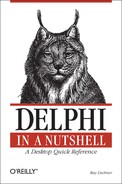Name
Extended Type
Description
The Extended
type is an Intel standard floating-point
type that uses 10 bytes to store a sign bit, a 15-bit exponent, and a
64-bit mantissa. Extended conforms to the minimum
requirements of the IEEE-754 extended double precision type.
The limits of the Extended type are approximately
3.37 × 10-4932 to 1.18 ×
104932, with about 19 decimal digits of
precision.
Unlike Single and Double,
Extended contains all of its significant bits.
Normalized values, infinity, and not-a-number have an explicit 1 bit
as the most significant bit. Table 5-2 shows the
detailed format of finite and special Extended
values. Not all bit patterns are valid Extended
values. Delphi raises runtime error 6 (EInvalidOp)
if you try to use an invalid bit pattern as a floating-point number.
|
Numeric Class |
Sign |
Exponent Bits |
Mantissa Bits |
|
Positive | |||
|
Normalized |
0 |
0...1 to 1...0 |
10...0 to 11...1 |
|
Denormalized |
0 |
0...0 |
0...1 to 01...1 |
|
Zero |
0 |
0...0 |
0...0 |
|
Infinity |
0 |
1...1 |
10... |
|
Quiet NaN |
0 |
1...1 |
110...0 to 11...1 |
|
Signaling NaN |
0 |
1...1 |
100...1 to 101...1 |
|
Negative | |||
|
Normalized |
1 |
0...1 to 1...0 |
10...0 to 11...1 |
|
Denormalized |
1 |
0...0 |
0...1 to 01...1 |
|
Zero |
1 |
0...0 |
0...0 |
|
Infinity |
1 |
1...1 |
10... |
|
Quiet NaN |
1 |
1...1 |
110...0 to 11...1 |
|
Signaling NaN |
1 |
1...1 |
Tips and Tricks
Use
Extendedwhen you must preserve the maximum precision or exponent range, but realize that you will pay a performance penalty because of its awkward size.Delphi sets the floating-point control word to extended precision, so intermediate computations are carried out with the full precision of
Extendedvalues. When you save a floating-point result to aSingleorDoublevariable, Delphi truncates the extra bits of precision.Refer to the Intel architecture manuals (such as the Pentium Developer’s Manual, volume 3, Architecture and Programming Manual ) or IEEE standard 754 for more information about infinity and NaN (not a number). In Delphi, use of a signaling NaN raises runtime error 6 (
EInvalidOp).
Example
type
TExtended = packed record
case Integer of
0: (Float: Extended;);
1: (Bytes: array[0..9] of Byte;);
2: (Words: array[0..4] of Word;);
3: (LongWords: array[0..1] of LongWord; LWExtra: Word;);
4: (Int64s: array[0..0] of Int64; Exponent: Word;);
end;
TFloatClass = (fcPosNorm, fcNegNorm, fcPosDenorm, fcNegDenorm,
fcPosZero, fcNegZero, fcPosInf, fcNegInf, fcQNaN, fcSNan);
// Return the class of a floating-point number: finite, infinity,
// not-a-number; also positive or negative, normalized or denormalized.
// Determine the class by examining the exponent, sign bit, and
// mantissa separately.
function fp_class(X: Extended): TFloatClass; overload;
var
XParts: TExtended absolute X;
Negative: Boolean;
Exponent: LongWord;
Mantissa: Int64;
begin
Negative := (XParts.Exponent and $8000) <> 0;
Exponent := XParts.Exponent and $7FFF;
Mantissa := XParts.Int64s[0];
// The first three cases can be positive or negative.
// Assume positive, and test the sign bit later.
if (Exponent = 0) and (Mantissa = 0) then
// Mantissa and exponent are both zero, so the number is zero.
Result := fcPosZero
else if (Exponent = 0) and (Mantissa < 0) then
// If the exponent is zero, and the mantissa has a 0 MSbit,
// the number is denormalized. Note that Extended explicitly
// stores the 1 MSBit (unlike Single and Double).
Result := fcPosDenorm
else if Exponent <> $7FFF then
// Otherwise, if the exponent is not all 1,
// the number is normalized.
Result := fcPosNorm
else if Mantissa = $8000000000000000 then
// Exponent is all 1, and mantissa has 1 MSBit means infinity.
Result := fcPosInf
else
begin
// Exponent is all 1, and mantissa is non-zero, so the value
// is not a number. Test for quiet or signaling NaN. MSBit is
// always 1. The next bit is 1 for quiet or 0 for signaling.
if (Mantissa and $4000000000000000) <> 0 then
Result := fcQNaN
else
Result := fcSNaN;
Exit; // Do not distinguish negative NaNs.
end;
if Negative then
Inc(Result);
end;